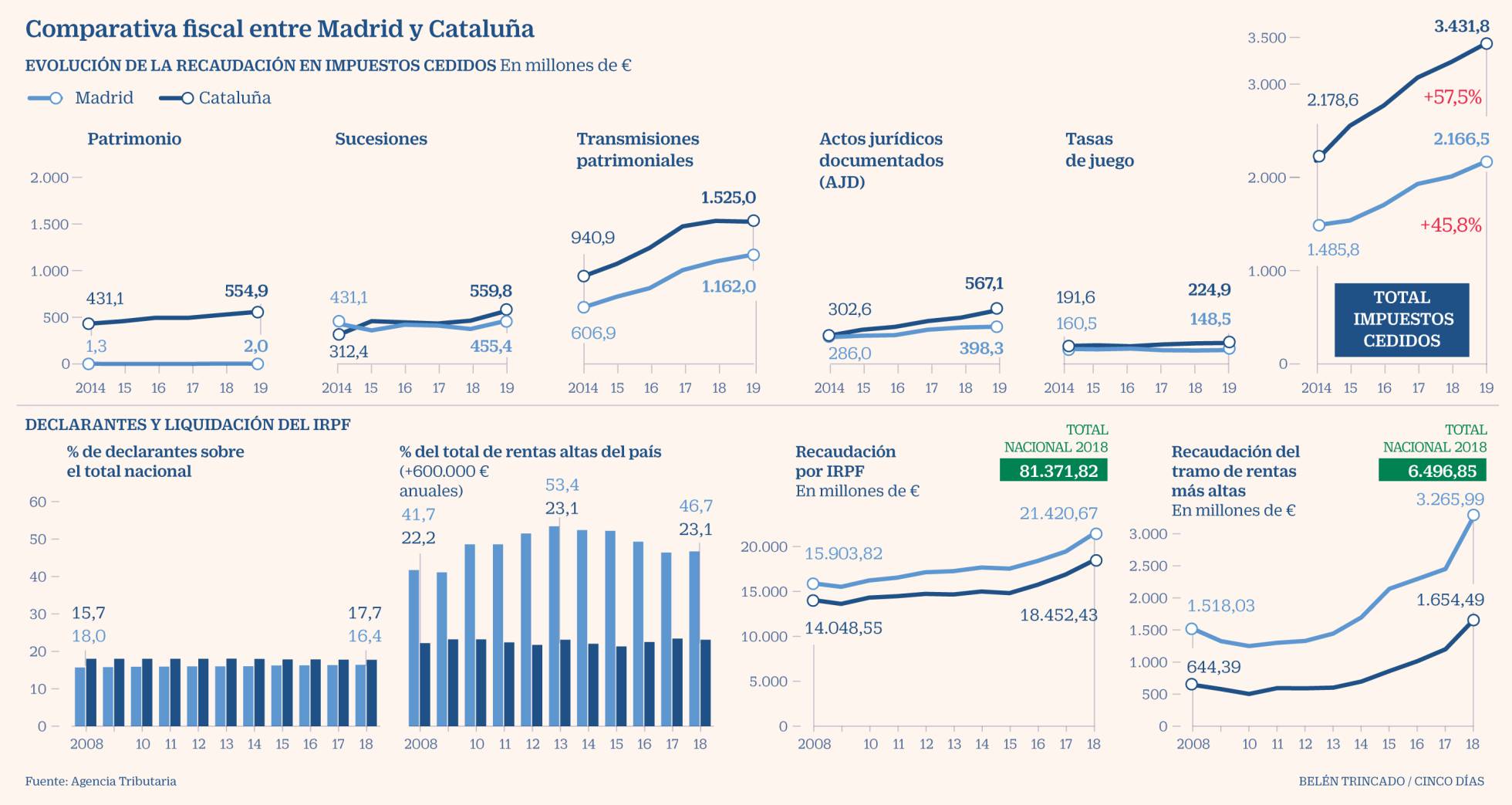The pact by which ERC will support the 2021 Budgets in exchange for the Government promoting fiscal harmonization between the autonomous communities has focused on two regions that represent the two extremes of the debate: Madrid and Catalonia.
The first for displaying a low tax policy, with the lowest regional income tax rate and the highest bonuses on ceded taxes, and the second, for imposing the highest rates on income and leading the tax burden on taxes under its management.
The Madrid coffers, however, end up receiving more in the large taxes due, to a large extent, to the greater concentration of high income in the region. A factor that is both the argument of both sides to defend their position.
Thus, while the Madrid governments of the PP defend that their low tax policy attracts talent and generates wealth, those in favor of imposing homogeneous tax rules accuse the community of taking advantage of its capital status to practice unfair tax competition, ‘stealing’ from its taxpayers more wealthy.
“If there are less taxes, there is more employment and more collection”, defended yesterday, from Barcelona, the president of Madrid, Isabel Díaz Ayuso, who accused the central Executive of “confronting territories”. It was backed by the president of the PP, Pablo Casado, who promised that his regions will “fight” to “continue lowering taxes.”
The fiscal harmonization, defended on the other hand the first vice president of the Government, Carmen Calvo, is necessary to solve “situations of asymmetry and imbalance” in the principle of equality among Spaniards. In turn, the Minister of Transportation, José Luis Ábalos, considered that the measure would improve the equality of the internal market.
“That a region as important as Madrid is practically living in fiscal dumping is bad news for those of us who believe in solidarity through taxes,” added the deputy of Comú Podem, Joan Mena, who argued that “secessionism fiscal ”of Madrid is causing a“ territorial crisis ”.
In turn, the parliamentary spokesman for United We Can, Pablo Echenique, estimated that fiscal homogenization would raise Madrid’s collection by 500 million, while the Ministry of Finance of this community fears that matching its taxes to those of socialist regions would mean an increase tax of 5,900 million.
We will have to wait until next year to see what the Executive’s specific approach is in this area. For the moment, the figures reveal enormous differences in the application of the assigned taxes. Madrid, for example, does not apply the Heritage tax, while in Catalonia it collects more than 500 million, half of the national income.
Since 2015, Catalonia also collects more from Successions (559 million in 2019) than Madrid, which has been raising the bonus among close relatives (and obtained 455 million last year).
The Generalitat also earns more than the Ayuso Executive in Asset Transmissions (1,525 versus 1,162 million, respectively); Documented Legal Acts (567 compared to 398 million); and gambling fees (224 vs. 148 million). Last year, the set of assigned tributes left 3.
Despite this clear difference, the taxes transferred are dwarfed by the personal income tax figures. With the lowest marginal rate in the country, 43.5%, and fewer taxpayers (3.37 million), in 2018 Madrid collected 21,420 million compared to 18,452 in Catalonia, which applies the highest marginal rate, 48%, and it added 3.65 million taxpayers.
To a large extent, the explanation lies in the fact that Madrid concentrates 50% of the country’s high incomes, compared to 25% in Catalonia. Thus, the Madrilenian pays 8,381 euros per year and the Catalan, 6,907.
In parallel, there is the circumstance that in recent years the Madrid economy has surprised the Catalan as the first in the country, while Catalonia has accused the bill of the process , which caused the departure of thousands of companies from the region through the Legal uncertainty that surrounded the threat of declaration of independence of the Government.
Despite the different readings of these figures, the debate has begun and while regions governed by the PSOE, such as the Canary Islands, support fiscal harmonization, others from the PP, such as Galicia, would only accept it “downward.”
In parallel, as revealed yesterday by the director of the Tax Agency, Jesús Gascón, in the XXX Congress of State Finance Inspectors (IHE), the treasury has been receiving a “growing demand” from the regions to control the veracity of the changes of domicile of its inhabitants to other regions with less tax pressure, in order to prevent them from faking such moves to pay less elsewhere while generating the same expense for them.



 Bitcoin
Bitcoin  Ethereum
Ethereum  Tether
Tether  XRP
XRP  Solana
Solana  USDC
USDC  TRON
TRON  Cardano
Cardano  Lido Staked Ether
Lido Staked Ether  Avalanche
Avalanche  Toncoin
Toncoin